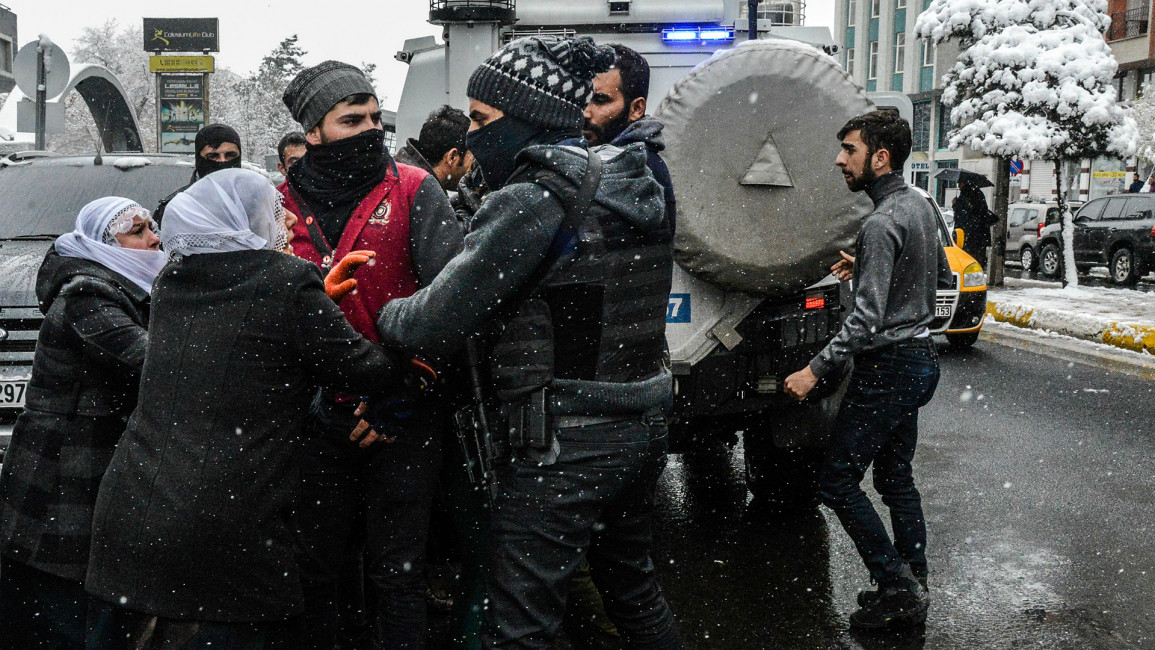Three women Kurdish campaigners killed in Turkey curfew town
Three female Kurdish political activists have been killed in fighting in a curfew-hit town in southeast Turkey as the authorities press an offensive against the outlawed Kurdistan Workers Party (PKK).
The Peoples' Democratic Party (HDP) said three of its female campaigners and another as-yet-unidentified man had been shot and badly wounded in Silopi town in Sirnak province late on Monday, accusing the authorities of failing to evacuate them despite pleas. All four died.
"These three women and the man were shot on Monday in the evening. They called to say 'We are wounded and losing blood, so get us out of here'," Leyla Birlik, the party's MP for Sirnak province, said.
"The HDP asked the authorities to evacuate them (from Silopi) but got no response," she added.
Silopi has been under curfew since December 14 as the authorities wage a major military operation to crush the PKK in the Kurdish-dominated southeast of the country.
The government says the PKK effectively took over towns by erecting barricades and digging trenches. But Kurdish activists say excessive use of force has killed dozens of civilians.
The HDP identified the three women as Seve Demir, Pakize Nayir and Fatma Uyar.
The man has not been identified because his face was so badly disfigured, it said. It was not clear under what circumstances they were hit or who fired the fatal shots.
There was no immediate comment on the incident from the authorities. Pro-Kurdish media insisted they were civilians and not combatants.
"The targeting of three women in the vanguard of the resistance was not a coincidence. They targeted the freedom struggle of all women," HDP's co-leader Figen Yuksekdag said in a party statement.
The HDP and the Kurdish movement in Turkey pride themselves of being in the forefront of promoting gender equality and usually split most senior posts between a man and a woman.
The PKK launched a formal insurgency against the Turkish state in 1984, initially fighting for Kurdish independence although now more for greater autonomy and rights for the country's largest ethnic minority.
The conflict, which has left tens of thousands dead, looked like it could be nearing a resolution until an uneasy truce was shattered in July.
In a typically tough address Wednesday, President Recep Tayyip Erdogan vowed that Turkey would press on with the "anti-terror" operations for the sake of all its citizens.
"There is not a Kurdish problem in Turkey. There is a terror problem," said Erdogan.
His remark is sure to infuriate many Kurds who argue there is a deep problem with the need to provide greater rights in language, education and politics.
Tensions are already high due to the military campaign and Erdogan has backed lifting the parliamentary immunity of the HDP's leaders to press charges over their suggesting autonomy of the Kurdish-dominated southeast.


![President Pezeshkian has denounced Israel's attacks on Lebanon [Getty]](/sites/default/files/styles/image_684x385/public/2173482924.jpeg?h=a5f2f23a&itok=q3evVtko)



 Follow the Middle East's top stories in English at The New Arab on Google News
Follow the Middle East's top stories in English at The New Arab on Google News


